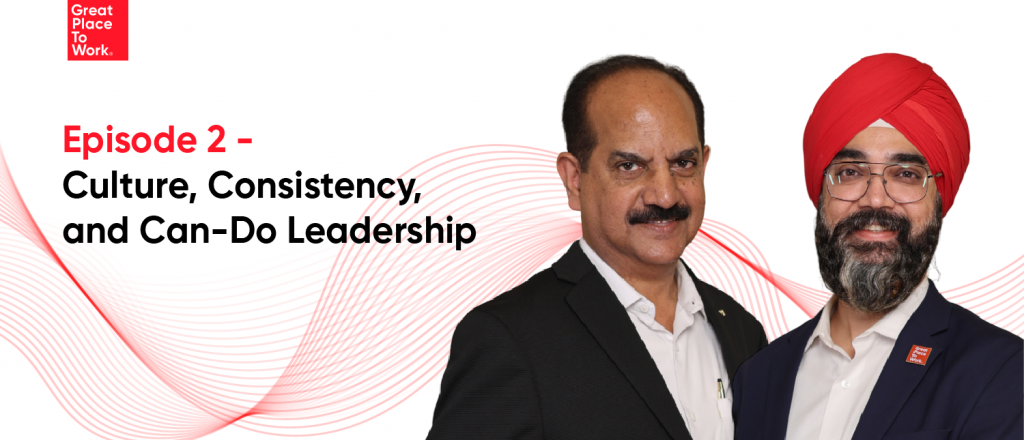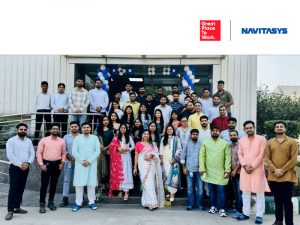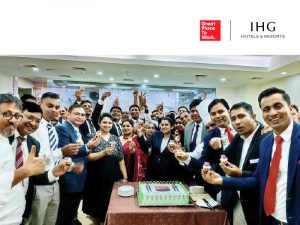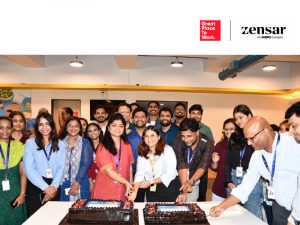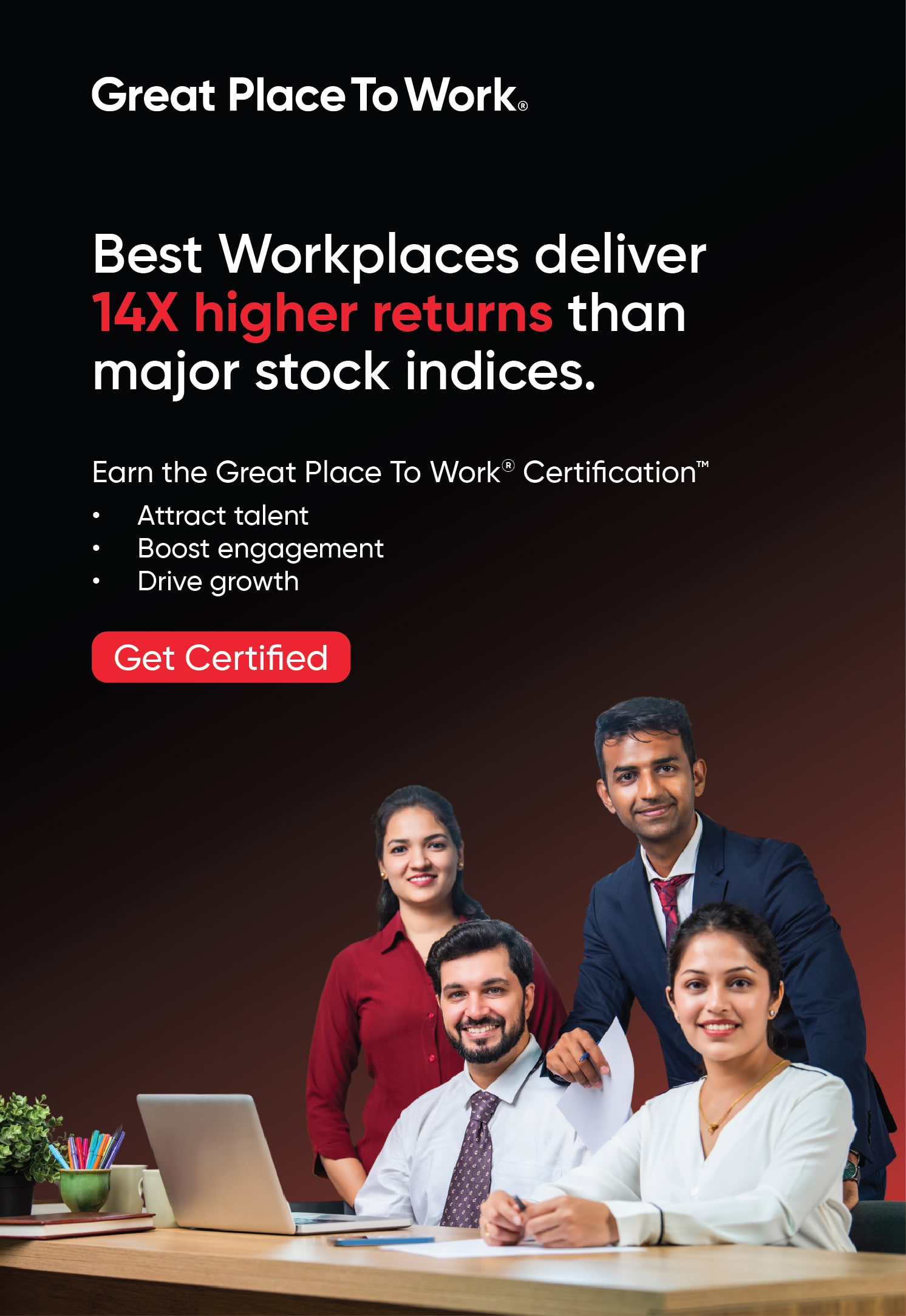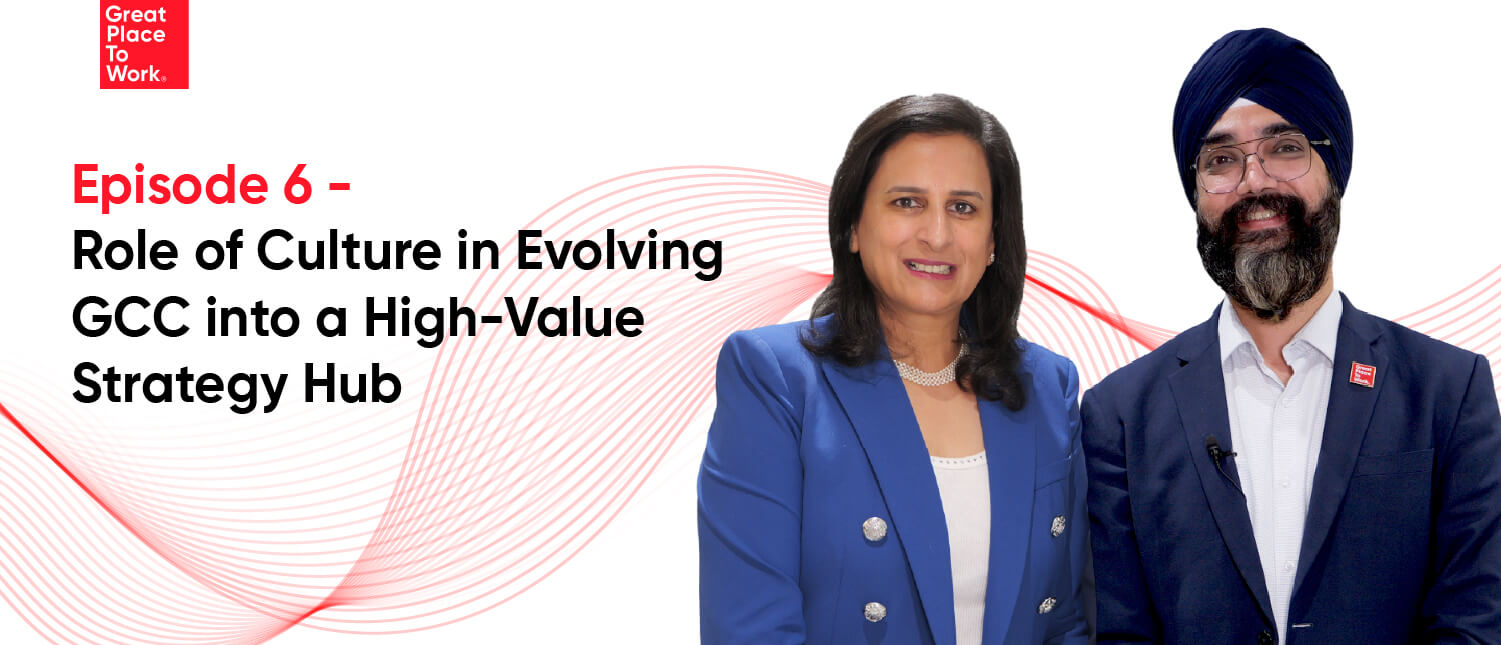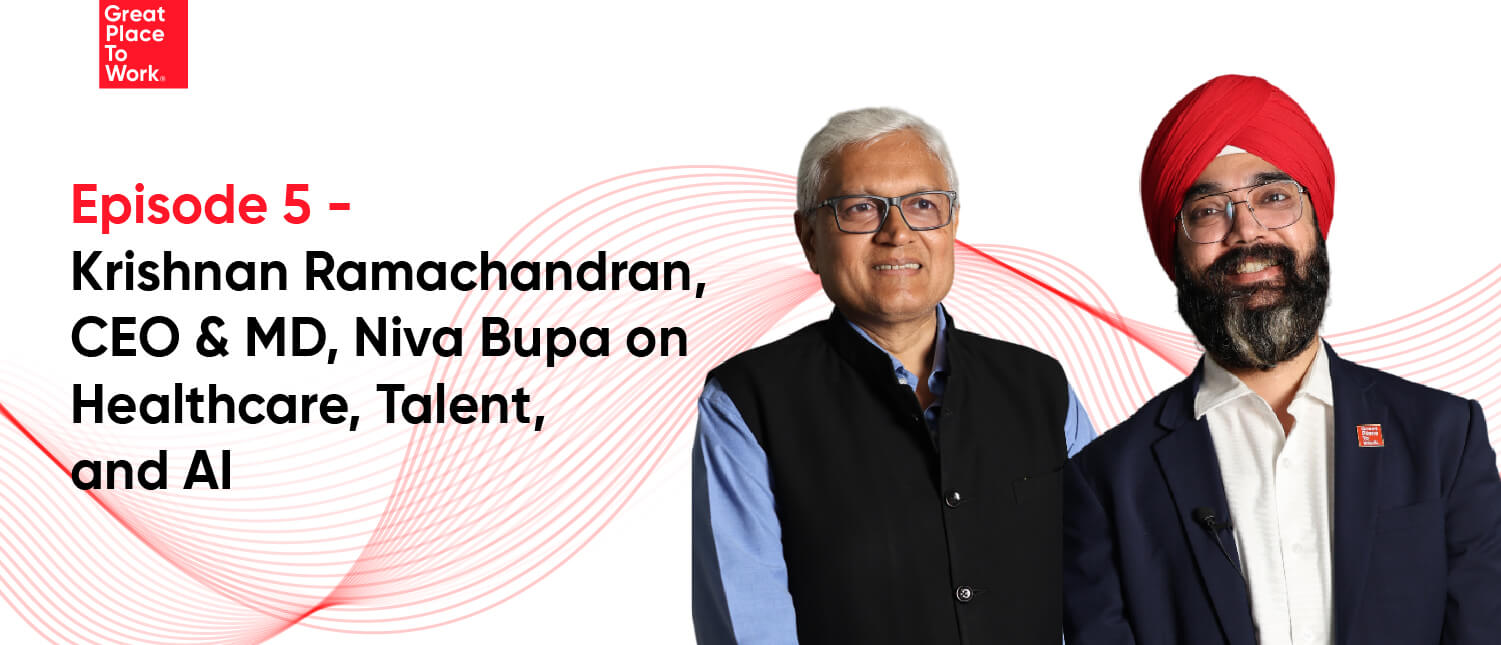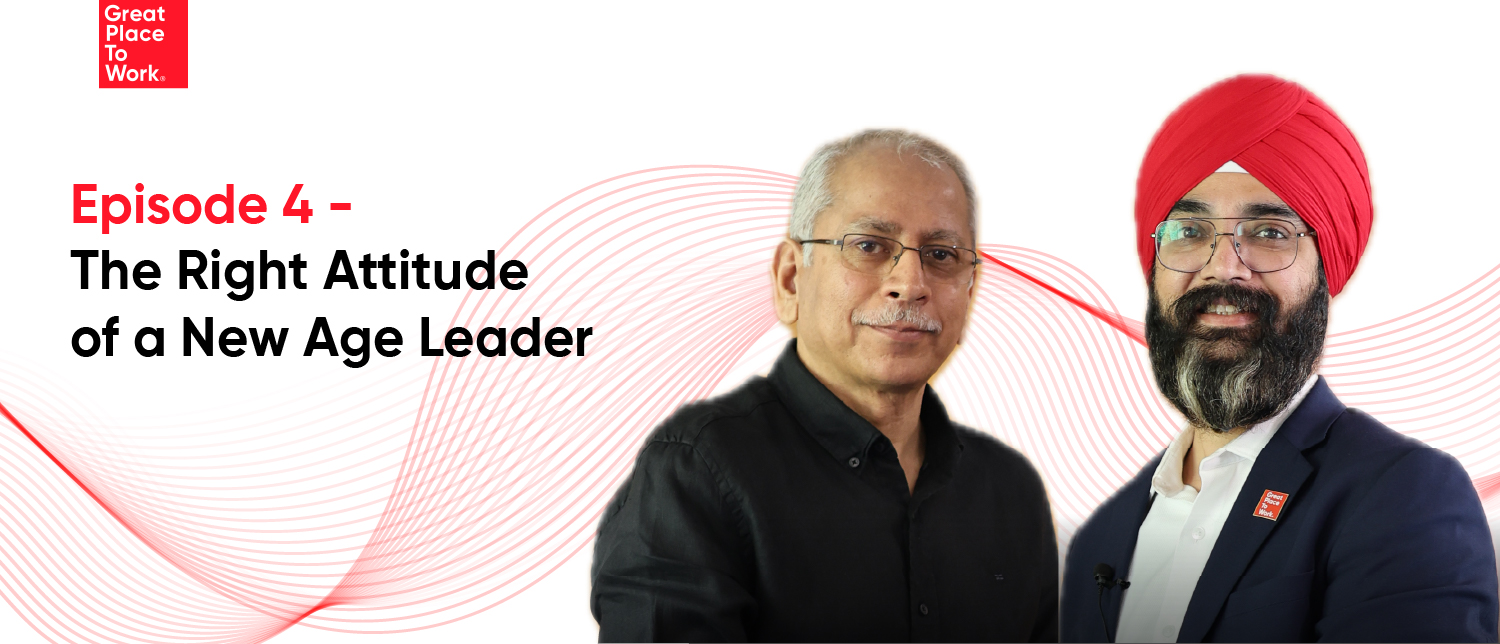A Glimpse into Blue Dart’s People-First DNA
What does it take to build a business that touches nearly every corner of the country, every single day? In an industry driven by speed, precision and 24/7 execution, how do you make people the centre of your leadership, not just performance?
In this episode of the For All Podcast, Balbir Singh, CEO of Great Place to Work® India, is joined by Balfour Manuel, Managing Director of Blue Dart Express, for an insightful conversation that goes beyond logistics, into the heart of Blue Dart’s culture and its unwavering commitment to its people.
From Day One to Decades of Ethos
Balfour Manuel, with over four decades at the company, begins his story in the early days of his career, as a fresh MBA graduate who walked in for a chance interview and walked out with an offer ‘way above’ his expectations. Balfour recalls being asked during his first interview, “Will you work for us?”, a question that, for him, reflected an early ethos of equality which continues to define Blue Dart’s culture today. “Whatever delighted me back then, we carry that DNA even today,” Balfour states.
And it shows. For Balfour, culture is an everyday experience. Blue Dart has consistently prioritised long-term relationships over short-term gains. Even when an employee chooses to join a competitor, they are treated with respect. It’s the same principle that’s helped people stay for decades, and it shows in the way leaders recognise and nurture potential early.
Empathy isn’t a Buzzword
Balfour speaks passionately about how Blue Dart takes care of its people, beyond performance. If there is an untimely demise of an employee, Blue Dart takes care of the family along with the kids. “The company will take care of us,” Balfour proudly notes, highlighting the confidence of every employee in the leadership.
This culture of care showed up in full force during the pandemic. From paying full bonuses, increments and gift bonuses to employees across the global DHL network, to pilots flying PPE kits across locked-down borders, their message was clear: “We are here during COVID, and we’ll be there with you, always.”
Everyday Moments, Extraordinary Culture
What makes a great workplace visible? Sometimes, it’s the small, unprompted moments. Balfour recalls an interview where a candidate appreciated him for his early experience where a tea boy wished him by his name and added, “Welcome to Blue Dart, Sir” despite being an outsourced staffer. It’s this deep cultural imprint that new employees can feel instantly.
Their unique induction program for “foot soldiers” is another testament to their culture, where recruits are welcomed warmly and share meals from day one. He recalls an anecdote of an employee on a project in Punjab who hadn’t had to bring his own food for four months because colleagues ensured he was fed, highlighting the culture of camaraderie and inclusion.
The Three-Lens View
Blue Dart’s leadership model rests on ethics and empathy. “We look at head, heart, and guts,” Balfour explains, a trio built into their performance system. Leaders aren’t just hired for their capabilities, but for their alignment with the company’s morals. “Take care of people; they will take care of your business,” Balfour says.
He also highlights the importance of psychological safety, where employees are not admonished for honest mistakes, even if it means speaking the truth to a customer or requesting for owed money. This commitment is ‘visible to the core from bottom to top’ by how a security officer accompanies an entry-level courier if they are called by the police, highlighting the sense of safety they create.
A Ceremony That No One Saw Coming
Somewhere in the podcast, Balfour casually drops a story about an award, a stage and a moment between a mother and daughter that no one in the room forgot, reminding even himself why Blue Dart’s culture stands out, even in the most routine settings.
Want to know more about his “fail safe” theory for taking risks or what lessons he draws from his love of cricket and art?
You’ll want to hear from him directly. This podcast episode is a masterclass in culture and care.
Tune in to the full episode! You might just rethink what makes a workplace truly great.
Show Transcript
SPEAKER_00: 0:00
Hello and welcome to For All podcast by Great Place to Work India. I am Balbir Singh, CEO of Great Place to Work in India. In this podcast series, we will be having interesting conversations with leaders from India Inc who have consistently created great organizations. Today we have with us Balfour Manuel, who is the managing director of Blue Dot Express. He has been with Blue Dot for more than four decades. And out of those last 15 years, they have been consistently working with Great Place to Work, India also to assess their employee feedback. And I’m proud to say that they have been consistently ranking in best workplaces in India for the last 10 plus years. Without further ado, I will request Balfour to do a quick introduction of himself and then we’ll get into our conversation.
SPEAKER_01: 0:47
Thank you for having me, Balbir. It’s Very glad to be here. I am a veteran Blue Darter to tell you one of those unique cases which has lived from inception till today and I head the organization and I’m very, very happy to be here for something called Great Place to Work for speaking to Blue Dart because we believe that every employee in Blue Dart should believe it’s a great place to work and that really brings Brings me a lot of happiness to be here today. Balbir.
SPEAKER_00: 1:22
Yeah. So, Balfour, I think I will not get as many opportunities talking to people who have spent like four decades in one organization, unless I go to a PSU. So tell us about your initial journey. You know, what got you started at Blue Dart and how are your initial experiences shaped your career? and for you to spend you know your entire working career at blue dart and right from joining as a fresh mba graduate to become the ceo and now the md
SPEAKER_01: 1:57
yeah so to start with we are definitely unlike a public organization we are a listed entity yeah but it’s like the can do is very very high and uh People who come from out are overwhelmed with the DNA. So I just have to say something and you’ll start seeing things happening. You don’t even have to follow through. So it’s a great culture that we embody. And I give the days of inception where the boundaries and foundations were set. I give credit to that. Things like we will always be ethical. We will be a front runner in what we do. We will be a highly people-oriented organization, people-focused organization that continues to be today. So one of the things that attracted me when I came, it was just a chance interview during my MBA to see trial and error. And it was like at the end of it, I had no chance. There were too many people there. And instantly after they met me, they called me and they asked me, can you work for us, Balfour? That question really hit me below the belt. Can you work for us? It was like, hey, you have people who can actually ask that. Will you work for us, was the question. And I said, yeah, I’ll be happy to. And then in the next week, 15 minutes, I had a letter in my hand with a compensation which was way above what I asked. So these were like delight. And I believe we continue that DNA even today. It’s always like, hey, if the person expects this, it’s going to be 20% above that. So whatever delighted me today, we carry that in the system. So Right early in the days, that was a big change in how an organization can speak. Here are the founders who are treating you as equal. And that continues till today. That makes us a great place to work.
SPEAKER_00: 4:07
But the most difficult question is, is how do you preserve that dna you know uh you shared your story and how do you try to make sure that you still are offering more than what a candidate expects but how do you make sure that because currently it’s not possible for you sitting there observing every interaction that’s happening in the organization. So how do you preserve that DNA in the organization? And what is your advice to your direct leaders who report to you? How do they conduct themselves in the organization? So that comes as an organization that is employee friendly, empathetic at the core, and really lives the value of great experience.
SPEAKER_01: 4:48
That’s a very great question. Tough one and a good one. So to continue the DNA, recently there was a customer talking about us, about our DNA, and I was like, customer’s talking about our DNA. So, you know, it flows from the top. For example, how are exit interviews treated? Forget about, you know, forget about entry. Entry can be very difficult. It can be a dream entry for an employee, but how are exit interviews treated? A good measure of what an organization. So we believe, I believe, the person who’s exiting is a champion of the company called Blue Dart. And if the exit is just great. So, I mean, quote unquote, even a person who’s going to competition, we treat them very well. And I’ve been questioned about this earlier, but we treat them in such a way that They just dread leaving Blue Dot. Such a great send-off and stuff like that. So they remain, and I can tell you, there are people who join competition but still refer business to us. That’s the part of Blue Dot that really excites me. Wherever you go, I’m expecting a call. Hey, we’re not using Blue Dot services. Why don’t you come? This is what I expect from an ex-Blue Dotter, he or she. That keeps happening and 80% of the cases. That’s a very high ratio. Balfour, I have joined this company recently. There was a very, I don’t want to quote, but very big brand who left and settled in Dubai. And I met him on the plane and he said, hello, how are you? He said, you know, I’m settled in Dubai, but I let you know where I’m going. I said, yeah. So Blue Dot will be there to help you. And last week he sent me a, saying, I’ve started this venture, I want you to know. And we’ll be welcome to start business with you. I think that is the flip side of having great relationships, strong relationship with people. Then how far are you going to go is always tested. How far are you going to go to serve your people? Serve your customers as business, but to serve your people. is very, very critical. So when they see things happening, recently we help people when there is an untimely demise, et cetera. We have a scheme which takes care of not just the family, but maybe kids. And I can emphasize that later, but that sends such a big message them that you know this is not a company who let you go even if the employees no more so uh it goes very deep and i think wow that will be one of the things that frames the dna this company will take care of us i’m jumping to another uh so we have uh we have been acquired by uh a global uh company called dhl
SPEAKER_00: 8:05
yeah
SPEAKER_01: 8:06
so similar dna there and just to tell you during the covid yeah the COVID is passed and forgotten. In the month of April, we took a call that all our increments, all our salaries, all our bonuses will be paid. Incredible. When nobody was having work and there was no business, we paid off that. And for this organization to give a gift bonus, not the normal bonus, 20%, a gift bonus, of something like close to 60,000 bucks in two tranches to every employee of this world. Forget Blue Dart. It just shows how far you can go. You can count when we are half a million people. And to give them all this out of your profits. So there’s a huge amount of money that Blue Dart gave out of its profit. Very large amount. Saying that this is for your well-being. We are here during COVID and we’ll be there with you. then our people would be wearing the full PPE kits and going out for delivery. I mean, only pictures will tell you that was happening. Our pilots were flying. Lights did not go out on a single night during COVID. We were flying. There was no airline flying. What does that talk about? Pilots come with their own cars, planes. men, women alike. And they fly the aircraft, they come back, they take their cars and go home. And when we fly to places like China, which we were flying to, of all the places we were flying to China to bring PP kits, right from where, you know, there was a lot of rumors it came from there. And these pilots cannot get out of the aircraft because they get out of the aircraft, they can be, you know, put into, you know, quarantine. So such… great commitment can only come from a DNA which is, you know, always trust begets trust kind of relationship that you trust the organization, organization trusts you. So it comes out from there. I hope I have conveyed how. And I think there is a push always to try and retain this DNA. Exit interview is one of them. Exit is one of them. How does person live? leave BlueDart. We don’t want him to leave BlueDart. Thank you.
SPEAKER_00: 10:37
I think I’ve also heard from you, I think sometime in the past, you also have a lot of Boomerang employees who exit and then come back. And we’ll talk about that later. But you know, at BlueDart, you have been there for decades now, but there are A lot of other employees who are the foot soldiers of Blue Dot who have been there for decades. And you shared some of the examples and how lights did not go off even for a single night. And there are organizations who are still talking about returning to office five years later. So it’s a totally different breed of organizations. So how do you build that commitment in that employee who joined yesterday and have that connect with the values? What’s that magic sauce that you have in your induction or when you induct them? What are those cultural traits that you look out for in your employees when you’re hiring them? I’m not talking with the leadership team right now. Just talking about any foot soldier that joins Blue Dart with, and a lot of this will be probably the sole earning members of their families. They’re the sole breadwinners. What inspires them and what motivates them?
SPEAKER_01: 11:46
Yeah, so I can go right to the, since you mentioned the foot soldier,
SPEAKER_00: 11:49
right? Yeah.
SPEAKER_01: 11:50
I have seen foot soldiers who are day one being welcomed as though, you know, you’re here for good. And then I see them breaking lunch with the team on the day one. You know, he hasn’t, he or she hasn’t got food, but everybody’s sharing the food. We have a person who’s leaving, doing a project now. And I met him close to Punjab. And I said, so how are you? You left Mumbai. He says, I don’t have to bring my food in even on a single day. Three times my food is taken care of. Breakfast, afternoon, and I don’t know about dinner. But he says, people bring food for me because I am from Mumbai. And I asked him, don’t you want to come back? It’s four months he’s on the project. He said, I’m very happy. This is a real case. So I think that welcoming culture is very much there in Blue Dart. I’ve seen them being coached. I’ve seen them being treated like, hey, you’ve been around for some time. So the flip side of it also, you’ll be asked to do something even before you are ready for it on the induction. So we have a terrific induction program which is lowered down now a little bit because the new age might. So we had a funny culture of, you know, day and night kind of induction. I don’t know. I can speak about it. So somebody comes and they are called for an induction during the day. So all the day activities tend onwards, all the day activities. And then they go down in the evening. They are let off home at about 7, 6.30, 7. But they have to report back at midnight for the night activities. So three, four hours of sleep, hopefully even more. not that. And they are on the night operations doing everything possible, right up to the aircraft, etc. Next morning, they’re out at about 6 in the morning. 8.30, they have to be back. 8.30, 9.30, whatever they get. So, this overwhelms somebody. At the same time, there’s a very close watch whether this is getting too tough on that. And at the end of the session, there is a graduation ceremony. This is like You are part of Blue Dot now. And they go, this doesn’t exist in the same form now, but they go to that remote location in the country and they try to establish a can-do. And he said, do you know, people don’t, in Mumbai, they don’t wait for the lift. They climb the stairs. What’s your problem? And it’s the kind of infectious passion that spreads across the country and believe me, visit an office in the foot of Himalayas and you will see a culture there. So that was like exporting the culture from one place to the other that, hey, this is not done. You know, we don’t delay these things. It has to be done now. So I think there are many things I can talk about, but this was one of them. So the orientation they get right in the beginning, quite overwhelming. But at the same time, it’s an acceptance of culture and saying that this is how it will be.
SPEAKER_02: 15:12
Yeah.
SPEAKER_00: 15:13
So when you have a large percentage of your employee population that’s feet on street, that has to remain very active throughout the day, personal well-being becomes very, very important for them. So what are some of the things that you do to inculcate that sense of well-being or personal health in your employees so that they remain fit to do the job, but they also remain fit even after when they retire from the job?
SPEAKER_01: 15:41
Great question. Employee health is on the forefront. So medical checks and any kind of, in fact, if somebody is, what do you call, unfortunately ill or things like that, then honestly, we don’t get rid of the person. The person is there for a very long time. even if it is, you know, hospitalized. I have many cases of like that, which also says a lot about the DNA. And it could be years that the person is recuperating, but the person is still there. There are examples like that. These are, again, some examples of how far you will go to take care of a person because the person has contributed and he has a family, is the earning member. So these are some of the things that we demonstrate today very openly, other than just in case of a demise, in very high number of cases, we absorb the children into the system. Very high number of cases. We ask them, does the spouse want employment or does the child want employment? That’s the first offer. It’s natural. I don’t have to say, but if there is an employable person, then in very high number of cases, they are inducted. So it’s like, hey, I mean, you’ve seen this in the armed forces, but this is blue dot. So we have that culture going. Again, one of the DNAs that I want to, you know, it’s quite funny. We actually have a whole family working with us in headquarters. Father, mother, daughter, all in managerial levels and it works very fine. And I saw one of these days, the mother giving an award to the daughter. These are things which is not easy to happen. Yeah, there’s a picture I saw and the mother’s giving an award to the daughter and they don’t mix up their portfolios. So I’m trying to bring that culture further that, you know, the family members are welcome. The reason is if they have seen their parent with a DNA right through their life, half of the orientation is done to the kids. So that’s a welcome change that, you know, people who really want to internships. Anybody who asks for internships, I’m okay. If it’s a, if it’s a, you know, employee’s child. So these are a few things that we inculcate all the time.
SPEAKER_00: 18:15
Next one, like you mentioned about mother and daughter working and that brings to me another question on diversity. You know, the way I have seen this industry and I, Whenever I get some courier delivered from Blue Dot, it’s usually a male. So what are you doing to increase the percentage of female employees in your organization? And what are some of the diversity initiatives that you’re running?
SPEAKER_01: 18:41
So great question. There is a very big effort to make the culture diverse, including the differently abled.
SPEAKER_04: 18:50
We
SPEAKER_01: 18:50
have quite a few inductees as a differently abled people also working in their job profiles where they can manage. But the diversity is a big one. I think we can be change maker because our people are on the street. So in Mumbai, there are locations which are fully women. The security guard, the courier, the manager, everybody. But that’s not what I want to bring forth. I want to bring equity. So 60-40. So Andheri West, it’s like 70-30. 70% female, 30% male. I prefer shoulder-to-shoulder working. But most important thing I want to tell you is that Blue Dart had this culture from 1983. Women were heading operations. Our couriers were 75% women. and working in the night. We’re bringing that culture down. So if you go today, the security head of a certain region is a girl. And I said, oh, you’re the security officer? Yes, sir. Wow, have you learned all the… He said, I’m a black belt, sir. So, you know, I mean, okay, you’re a black belt. Great. And then I go to the airport in the night. I see all the screeners are women. The x-ray screeners in the night for Blue Dart in one or two regions are all women. So I said, this is a great place. I mean, it’s a nice place to work and they’re very focused. The operations are very smooth. So there is an effort. The latest, which I heard yesterday, was we inducted management trainees, about 40-odd, and 60% of them are women. Not because of effort, but probably they are fit for some profiles we are looking for. So there is a concerted effort to bring in not only gender diversity, but also differently abled people in the right. So a lot of inclusivity. So we have, it’s very touching. We have people who are helped to go for lunch, et cetera, but happily. There’ll be two people, three people escorting them lunch and it’s really hot warming whether it’s a wheelchair or whatever so we have situations like that but I hope that grows where it’s a very, very inclusive culture.
SPEAKER_00: 21:17
I think that’s one topic that’s very close to great place to work also. When we talk about creating great places, we talk about making it a great place to work for all. And when you talk about gender diversity, when you talk about having people with different abilities as part of your organization, you have to create an ecosystem around it. You just can’t hire two of them and assume that they will self-sustain in the large organization that you have. It requires a huge amount of thought process. So now going back to your leadership team, you know, what are the traits that you look for when you hire someone who has to work very closely with you and someone who is able to, you know, be a flag bearer of the value system that you have created at Blue Dot, but someone who’s also good at running the business and delivering results. So what are some of the things that you look for when hiring leaders?
SPEAKER_01: 22:17
Yeah, one of the things that we do background check on is ethics. We want very ethical people in the business. So that’s what we look at the profile first. And then we look at somebody who’s very people-oriented person. I have particularly paid attention and not inducted people who don’t seem people-oriented. That empathy should come through in the dialogue. And that is the second one. So people leadership, very critical because people are a big capital in Blue Dart, right? Behind every package, there is a person. It’s not automated. Every aircraft is run by a lady or a man. So everything that we have as technology is run by a human being. So we believe that’s a big resource in a service industry. It’s a big differentiator. The third one is the can-do and transformational attitude of the person. That person has to be a transformational leader in his thoughts, etc. He cannot be a legacy person. We did it this way before, but today it’s different. So can-do is one of them. The ethics is the other. Transformational leadership is very important, but very critical on top of them is how good are your people leader. That comes out naturally. Because like you said, Balbir, we have to retain the DNA. So that comes out on the top. These are three, four things. There are two, three metrics that we also measure over a period of time with a lot of technical dimensions to them, which is how the head, heart and guts work. Our HR team will tell you it’s a metric for performance appraisal. head, heart, and guts. And the superior has to, the person has to self-rate on the head aspects, on the heart aspects, and on the gut aspects. And the superior has to either agree or disagree and put these stars, which are like head is five, but can do needs improvement. So it’s three. And guts, you know, very high or whatever. And The other thing that forces them is all cannot be high. So it says one has to be low and one has to be, you know, one of the qualities can be high. So there is a parameter which doesn’t allow you to say everything is five star. So that just says that we look at leadership not just by performance, but the managerial skills, the leadership skills on head, heart and guts. And the fact that it is ingrained into our performance apparel system says that we are actually using this tool across the globe, not just in India, but across the globe. I think that should tell you the kind of leadership that we see. And I do see that the impact of that, you know, when I meet even junior people, they have a can-do that is slightly higher than their grade. And I believe frontline people make things happen. Middle managers make things happen, not just senior management. And I have a great regard for our middle management who can turn the world upside down if I ask to get something done. And I think that comes from having the three parameters of head, heart, and guts being used when it’s required.
SPEAKER_03: 26:14
Yeah.
SPEAKER_00: 26:16
So if I were a leader joining Blue Dot, what will be your first advice to me? Head, heart or gut? What is that area that one should be focusing on? And that’s a non-negotiable for you. Because there are some skills that can build over when you join an organization. There are some cultural aspects that you can pick up by observing others. But what is that one non-negotiable that you will look for in a leader when you’re hiring someone?
SPEAKER_01: 26:41
So I have slightly a different take on that. I like, there is a thing that I keep saying, keep the main thing, the main thing. Yeah. So I look at the person whether he’s very focused on, focused and determined on the subject matter and that you can actually gauge from the conversation. That’s very, very important. Keeping the conversation distracts out and focusing on what they are doing past results are fine but you know fitting into a system which can change overnight does he have the caliber of we have situations where we have to take a call which is overnight do the person have the wherewithal of an open mind and a can do is something that I always look at because our industry needs that. Yeah. So we touch some 55,000 points. It’s not controlled here. It’s controlled. We are a decentralized kind of operation. So we need people who have the courage to take things forward, but at the same time, we will empower them. Passion is fine, but empowerment builds the trust in taking this forward. And there’s also a culture of not admonishing people. mistakes, which is another great attribute that we try to carry forward. We don’t really admonish mistakes. We caution, but never a penalty to be paid by the employee. Never. There are cultures who will say, find the person, demote the person, do this, do that. Never in Blue Dart. But the message is very clear. Hey, this cost us so much, right? So I think that has been carried forward in the DNA. For example, if you want to tell the largest customer the truth, it’s okay. You know, you won’t be penalized. You did the right thing. So I have great examples for that. You know, for example, asking for your money. Yeah. Money belongs to us. We deliver the service. One of the things is cash flow, right? I mean, you need to keep the cash flow going. So ask for your money is a DNA. or blue dart. And if somebody asks for the money, which is owed, and our customer doesn’t like it or whatever, the employee is never admonished. He’s doing the right thing. So, you know, giving the right messages at the cost of, you know, having to face a bigger issue, but taking care of the employee also, I have your back. You know, so mistakes happen every day. But I don’t think we have, other than ethical thing, we never terminate people who have done a mistake ever that I know of. And there are times when I have sometimes come to loss of a customer, which we don’t like. We hold our customers very closely, but we would not really penalize the employee if he’s done the right thing. There are examples for that. One of them is asking for the money. And in one such case, I remember the person approached the highest in the hierarchy and that became a big issue. How can you approach the stalwart of this brand organization? But the employee got nothing but just a pat saying that it’s okay. And then, of course, there was issue saying this is not the way. But he was doing something which was his KRA organization. So those are things that really keep the culture intact, saying that people will not be admonished for doing something which is right.
SPEAKER_00: 30:40
No, I think when we study organizations that have high value on psychological safety and care, they create greater organizations. I think what you just shared is a case of, you know, creating that psychologically safe workplace for your employees where they know if they are doing the right things. they will not be wronged. In that sense, the right message where, you know, management walks the talk and not just, you know, in words, but in letter and spirit. So, with that, I’ll move to the… I can
SPEAKER_01: 31:14
give you another example. Yes, yes, please. If a courier, courier is the entry level, is called by the police, he doesn’t go alone. There is a security officer with him all the time. That’s the culture. He’s the entry level entry-level person but that’s the culture of blue dart so you know that’s like hey you’re in trouble but we’re there with you of course it can’t be uh something unethical the person did but normally if there is a interaction like that then he’s backed up i’m just felt like giving you that as as an example
SPEAKER_00: 31:52
yeah no that uh goes a long way in creating a sense of safety and and uh If I’m a new person just joining an organization, 22, 23-year-old, I would like to stay away from police. That first or second experience is always scary. So definitely, I think that really sends a message to the people that we are with you in your times of trouble. And if you haven’t done anything wrong, then don’t worry about it. And so Balfour, what I want you to know, like you shared some of these experiences. Tell me your own experience where… when you were growing up as a leader, where one leader showed that trust in you and that has gone a long way in what you are today. So what’s that one leadership advice that you received when you were growing up in Blue Dart that has stayed with you till today?
SPEAKER_01: 32:48
There are many, when you ask for many, many, many such experiences that I’ve had that… makes me feel I did the right thing by staying in the organization. Right from the beginning, I said the ability of a very strong ethics-driven culture is safe place to be. So something unethical is not allowed. So safe place for CEO and MD and also for employees. So nothing like that is ever encouraged. So that’s one of the things that I’ve always felt The other thing is like ability to speak your mind. Yeah, is very, very easy to do. So if I meet a courier and I ask them, when I say courier, you tend to meet them and sometimes you look at, hey, what’s your name, whatever. And I’m able to ask him a question that how’s life treating you? He should be able to tell me if something is going wrong. there and it’s not like everything is fine but somehow we have developed a culture where he can actually say sir these are things which I would like you know for myself and then you go back and put a message to saying I met so and so and he was talking about this can you take care of this instantly and then there’s a follow up on that saying that this is done he’s very happy now till then I will not let go A customer tells me there’s a problem. I need to get a delight word from the customer. That’s the DNA. So these things really feel very empowered that you write to anybody in the system, not as a managing director, but any level in Blue Dart and you can get something going. There are no hierarchies coming in the way. What are you doing? So let’s say my entry level guy writes to somebody, a male, saying that, you know, I’m coming to Punjab. Can somebody help me? Nobody knows. He’s picked up. He’s taken care of. Whatever. Gives a great environment to work. And that has continued for last many, many, many decades. And I was telling my somebody I met, I have a new set of people who have joined me as my reportees. All of them pedigree and from who’s who. And they are overwhelmed with the culture. And it’s my job to keep them… Say that this is normal. When you go to a location, you’re a celebrity. I mean, what’s that Indian thing saying? Visible. Visible to the core from bottom to up. That’s a culture which, you know… shows that, you know, there is uniformity across. It’s not pleasing somebody, but you’re welcome. Everybody knows. So when I was interviewing one of my senior people, reporting directly to me, and when I met him first, he says, I like the culture here, even before I. So I said, how are you talking about this? No, the tea person came and he wished me by name. I didn’t know this. He’s still there on my floor. He wished me by name and he said, how are you, sir? Welcome to Blue Dart. He’s an outsourced person. And this gentleman who came from, I mean, you know, he’s a direct reportee and he’s like, how do you manage this? How did he know my name? And he said, welcome. Even before I started talking to him. So there is something about this organization that’s rubbing off. He’s still on my floor. If you come and visit, maybe he’ll do the same thing to you. Nobody told him that. So he took his name and he said, hello, Mr. So-and-so. Welcome to Blue Dot. Is there something I can do for you? This is an outsourced person who spoke in English the way he said. And when I met him first, he said, I admire your culture. I said, when did you see my culture? He said, the housekeeping person asked me. How are you doing, sir? Do you need any help?
SPEAKER_00: 37:09
Yeah, I think there’s a saying we keep saying that you know a great workplace when you enter one so is that you know positivity in the air that you can you can feel the warmth and that’s true for you know a lot of the great workplaces that we visit uh my last couple of questions you know one thing that i ask all the leaders that i uh have this interaction with number one is what is your advice to the leaders young leaders who are picking up the reins of running organizations or business units right now with the macro environment that we have. So what’s that advice that you will give to the young leaders?
SPEAKER_01: 37:48
Yeah, that’s an area where a lot of organizations are groping. So we have the Gen Zs and everybody in mixed culture, long, you know, people who have spent 17 years in the company as a DNA, as their co-partners. How does that culture? Fortunately, it seems to be vibing well always. And I think that’s part of the DNA. People who are 50 feel they are 25. So that’s the culture. So, you know, one of the things I tell the young people is that, you know, you are empowered to do new things. Again, the same thing. But always keep the main thing the main thing. Don’t fret about small things. And when I say main thing, the elephant comes to mind. you know catching the tail catching the trunk that story so keep it keep it very focused main thing the main thing if you want impact everybody who works in blue dart we expect them to have something called a bite b-i-t-e bite b-i-t-e and bite translated is creating an impact so sometimes i ask what is the impact that you’re creating in your job area It’s a difficult question, but then he has to think, he or she has to think, am I impacting my workplace? Critically, you know, introspection. So a bite is very critical, whether it’s a new person or somebody who’s in the system for 20 years. This is one aspect that we want in every Blue Dot person. He or she, doesn’t matter.
SPEAKER_00: 39:30
So Blue Dot has been on the Great Place to Work list for… many years in India. Since
SPEAKER_01: 39:36
inception?
SPEAKER_00: 39:37
Yeah, since inception. Since we started in 2008 in India. So how has the Great Place to Work partnership helped you create a culture of empathy or the culture that you have? Your culture existed before Great Place to Work existed, actually. But how has this partnership helped you in getting even better?
SPEAKER_01: 39:56
Obviously, there are measurements now. And particularly the element of trust, the element of camaraderie, the element of team play, the element of empowerment, whatever you call it, have measures. And we are very happy to plunge ourselves into any measurement tool that says we are a good place to work. It should show on the face of people that this is a good place to work. I haven’t heard any time somebody saying, You know, I don’t like this workplace. So that would be a big question mark. And so our journey with GPTW is very enjoyable. I mean, the more parameters you push, the more happy Ludhart will be to measure. We had a 360 degree feedback from managing director to the last person worker in the system in entry of 1990s, that is 89-90s. So it’s that many years when it’s getting better where a managing director is standing in the room and there is 360 degree feedback given to saying, some of these things we don’t like. Some of these things we like. And often the manager would say, do you want me to go out? And the culture is no. We’ll give you feedback on the face. And of course, there are some areas where you would want the person to go out to make the team more, but that exercise existed in 90s. So we invite the employee engagement in our survey, every year employee survey, we have three take home KPIs. One is employer of choice.
SPEAKER_03: 41:53
Yeah.
SPEAKER_01: 41:53
provider of choice, which is for the customer, an investment of choice for our shareholder value that we create. So in the employer of choice, always there’s 360 degree survey, internal, and 97% is the participation. That tells you, and we want to say, who are these three people, 3%? Of course, they’re on leave, so on and so forth. But year after year, 97% participation in our employee survey which tells you that people want to say what they want to say then there is a feedback and then there is a you know survey feedback and then there
SPEAKER_00: 42:35
is action
SPEAKER_01: 42:36
so this moves into another frame of conversation which is called open houses we call them samvath so when they go and meet a team it’s of course very casual conversation but some of these elements that they brought out are shown to them saying that this was brought out, this is addressed. Giving them a feeling that, you know, we can actually speak anything. It may be a small thing. It may be like, we need a car park here. We need one more toilet. When we meet them, I think it’s quarterly that we meet every, when we meet them, then we are supposed to say, hey, three months earlier, six months earlier, you asked for this. It’s here. So it’s like, they have indicated what we asked and it’s as small as a necessity you know that we are delivering what is he or she asking for many such things tea you know tea is a component that is given we need across the board we need tea to be served to us they can pay for it but let it come as a you know as a gift so it’s given but there is pleasure We get tea in the office at least twice a day to the front line. It’s a tiny thing, but yeah, you don’t have to pay for it.
SPEAKER_00: 44:01
I think one of the biggest health indicators of an organization that the leadership team is listening is the response rate. And having a 97% response rate is no mean feat. It means really employees are sharing the feedback because they know someone is going to act on it. They have trust in the system. Yes. So I think with that, I will move to a rapid fire question. I have quick fire about seven, eight questions for you, Balfour. And And I would expect a quick answer, short answer from you. Sure. Okay. Number one is, uh, what are the three books that you would recommend, uh, that you love, love reading and had a lot of learnings could be fiction, nonfiction. I don’t care, but what are the three books that you would recommend?
SPEAKER_01: 44:46
Uh, Peter Senge, there is something called systems thinking. It’s called the fifth discipline.
SPEAKER_00: 44:53
Yeah.
SPEAKER_01: 44:54
Uh, uh, that I would recommend because this gives, uh, system thinking to everything that you do. And it’s crazy. It talks about a bumblebee who’s flapping its wings in New Zealand. And how does that energy impact a typhoon? It’s crazy, but you need to understand everything that you do has an impact, but they’re not related in time and space. The impact could be much later. Yeah. So that’s one. it’s making me, making it very difficult for me to go to the best books possible. But in my, the Blue Ocean Strategy was something that I liked very much because it relates to the kind of business niche that we want to be. Create something which is very difficult to, you know, to remake or to bring back. So you’re in a competitive niche. Yeah, the third book I’d like to recommend is the Lessons from the Titans. And it kind of ingrains somebody else who discovered a good way to do business. And the author’s name starts with Scott, Scott Davies. That’s the first author, the other, there are two more people who wrote.
SPEAKER_00: 46:07
Okay. Okay. Who’s your personal role model? leader that you take a lot of inspiration from?
SPEAKER_01: 46:14
In my days, some of them are still around. And in my days, it was JRD Tata. I had the opportunity to meet him. And he knew Blue Dot. That was my mana for that day that Blue Dot is doing well. And that was like, he knows Blue Dot. He understands Blue Dot. Even today, when somebody says… I know Blue Dart, I feel very proud. If you allow me to extend, when Blue Dart was being acquired, the head of the group, which is Deutsche Post DHL then, was in Davos. And he found one Indian there, who was, by the way, Singh, Mr. Brar, who had owned Ranbaxy and things like that. So he went and asked him, We’re looking at this company called Blue Dart, you know. Do you know anything about them? That’s my career. I trust them fully. And when the chairman came to India and I was sharing one-to-one, he said, you know what? The first man I met, I talked about Blue Dart and he was, he said, I know Blue Dart. That’s my personal career. Makes me feel proud. And I think every Blue Darter should be proud. You know, mind penetration. share of mind yeah and share of trust yeah is just just unbelievable so recently the previous ceo of amuls which is such a big global brand yeah he had his he connects with me and is uh uh he retired or he moved to another organization uh and he connects with me saying hey i have this problem and we do something uh he says look i can pick it up i can do this whatever and he is in uh in in gujarat yeah so uh we send two people especially to deliver and what he did was he made the courier stand two couriers went there at that time for whatever reason the driver made them stand wrote a board behind saying uh blue dart great job whatever he took their names And he sent me a video. And this is the Amul CEO, managing director, saying that, you know, so-and-so, so-and-so, you are unbelievable. And if you ever want to, you know, I’m a Blue Dot fan, whatever he said. For me, that was like, he was the previous CEO. And for me, that was like, everything that I do, you know, is coming out from a customer’s mind who has just seen some great experience that he had with the brand. So that’s something I wanted to say.
SPEAKER_00: 48:58
I think when customers share such positive notes about the work that you do and how it impacts them, I think there’s a bigger sense of pride that any CEO or a leader can get. Moving to the next question quickly. Yeah, sure. What is that one best piece of advice that you have received as a
SPEAKER_01: 49:17
leader? Fail safe, take risks, but fail safe. There is a method called fail safe, which means you always have a backup plan. Take risks, take big risks, but you have a fail safe. Just in case this doesn’t work, what are you going to do? That plan must be as safe as the risk that you take. So fail safe. I think there’s a theory called fail safe. I read a book called fail safe or whatever related. So that’s one thing. And then I have said this again and again. Keep the main thing, the main thing. We often get distracted to the other areas, but keep your focus on the main thing.
SPEAKER_00: 49:57
If I were to define your leadership style in not more than three or four words, how would you do that?
SPEAKER_01: 50:05
Vision, empathy, relentless. Those are three words.
SPEAKER_00: 50:10
Okay, great. And what’s your advice to the leaders from all over India? what is that one thing that they should practice on daily basis to become even better leaders
SPEAKER_01: 50:25
take care of people they will take care of your business
SPEAKER_00: 50:28
okay and the last question from my end is what is that sports or what’s your personal hobby or sports that you enjoy the most
SPEAKER_01: 50:40
lots of hobby just like everybody else I have pictures with the Mumbai Indians. Okay. So it’s not just the young ones, but I have pictures and I keep them proudly on my phone. And we also carry the baggage, which is another pride. So Mumbai Indians’ baggage is moving through Brutart. Okay. And there are pictures. Hey, we are carrying this baggage every night. So again, a sense of pride. I love cricket. I love soccer. But I also love art. So every time I’m in a different country, Now my colleagues are following me into those areas where art, you know, where there is anything that is architecture, decor, so on and so forth. We recently visited Turkey and we enjoyed the biggest enjoyment was when we went into a palace called Tokkapi Palace. And team was really happy that we went there. So I think that culture is resonating.
SPEAKER_00: 51:42
and anything that you think people who are listening to this podcast must know something that I did not cover something that you would want to add before we wrap up
SPEAKER_01: 51:56
I said everything that we said but one thing that we are India is on a cusp of make it or break it whatever we hear today tariffs etc is a wake up call for India to liberalize. And this is the moment of truth where this country can evolve as a change maker. We have everything in us. We have trade. We want to manufacture. For example, if we manufacture, we need to export. You don’t manufacture only for consumption. So if you manufacture, you need to export. If you want to export, you need to keep your tariffs low. So, you know, the import duties have to be lower. So the advice is this is the moment of truth for India. And I’m sure we are moving in a direction where we will change the world. India will change the world. Informed people, great workforce, future ready workforce will be from India.
SPEAKER_00: 53:00
Thank you. Okay. Thank you. Thank you, Balfour. It has been a pleasure speaking with you. I hope our listeners also enjoyed it. Thank you.

